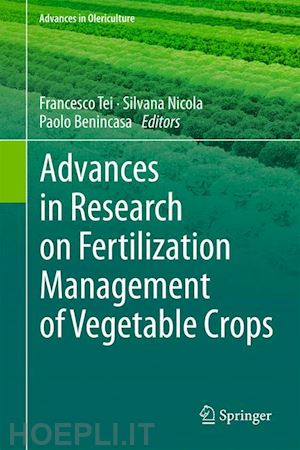
Questo prodotto usufruisce delle SPEDIZIONI GRATIS
selezionando l'opzione Corriere Veloce in fase di ordine.
Pagabile anche con Carta della cultura giovani e del merito, 18App Bonus Cultura e Carta del Docente
Chapter 1: The role of research for a sustainable fertilization management in vegetables: future trends and goals
Francesco Tei, Silvana Nicola, Paolo Benincasa
Abstract
1. Vegetable production in the world
2. Health and economic benefits from vegetables
3. Peculiarities of fertilization in vegetable crops
4. Fertilizer consumption in vegetable production
5. Making fertilization sustainable in vegetables: trends and goals of research
References
Chapter 2: Tools and strategies for sustainable nitrogen fertilization of vegetable crops
Rodney B. Thompson, Nicolas Tremblay, Matthias Fink, Marisa Gallardo, Francisco M. Padilla
Abstract
1. Introduction
2. Nature of output from tools for N management of vegetable crops
3. Methods based on soil analysis or soil N supply
4. Nitrogen balance method
5. Methods based on crop/plant analysis
6. Use of proximal optical sensors
7. Luxury N consumption and responses of monitoring approaches at excessive crop N status
8. Use of simulation models and decision support systems for N management
9. Application methods
10. Specialised fertilisers
11. Future developments
12. General considerations
13. Conclusions
Acknowledgements
References
Chapter 3: Organic matter mineralization as a source of nitrogen
Stefaan De Neve
Abstract
1. Introduction
2. The process of N mineralization
3. Measurements and mathematical description of N mineralization
4. Predicting N mineralization
5. Environmental factors influencing N mineralization
6. Sources of organic matter
7. Synchronization of N mineralization with crop N demand
8. Conclusion
References
Chapter 4: Fertilizers: criteria of choice for vegetable crops
Paolo Sambo, Carlo Nicoletto
Abstract
1. Introduction
2. Mineral fertilizers
3. Organic fertilizers
4. Conclusions
References
Chapter 5: Crop Rotation as a System Approach for Soil Fertility Management in Vegetables
Paolo Benincasa, Giacomo Tosti, Marcello Guiducci, Michela Farneselli, Francesco Tei
Abstract
1. Introduction
2. Use of fertilisers in vegetable crops
3. Role of cover and green manure crops
4. Intercropping vegetables
5. Crop residue management
6. Crop rotation in non-specialised organic and conventional farming systems
7. Crop rotation in specialised vegetable cropping system
8. Conclusions
References
Chapter 6: Localized Application of Fertilizers in Vegetable Crop Production
Eric H. Simonne, Aparna Gazula, Monica Ozores-Hampton, Jim DeValerio, Robert C. Hochmuth
Abstract
1. Introduction
2. Root response to localized fertilizer application, the environmental impact of vegetable crop production and strategies for reducing nutrient loss
3. Principles and practices for localized fertilizer applications to vegetable crops
4. Conclusion
References
Chapter 7: Water and nutrient supply in horticultural crops grown in soilless culture: resource efficiency in dynamic and intensive systems
Giuseppe Pignata, Manuela Casale, Silvana Nicola
Abstract
1. Introduction
2. Soilless culture systems and input control
3. Substrate properties for plant nutrient uptake
4. Water in horticultural soilless culture systems
5. Formulation of the hydroponic nutrient solution
5.1. Macro-, meso- and micronutrients in soilless culture
6. Indicators used in the soilless culture system
7. Open-cycle or closed-cycle hydroponic systems in soilless cultures
8. Planning the nutrient supply in soilless culture systems
9. Hydroponic nutrient solution supply systems
10. Conclusions
References
Chapter 8: Plant breeding for improving nutrient uptake and utilization efficiency
Antonio Ferrante, Fabio Francesco Nocito, Silvia Morgutti and Gian Attilio Sacchi.
Abstract
1. Introduction
2. Physiological, biochemical and molecular traits affecting nitrogen uptake by roots
3. New approaches for improving Nutrient Use Efficiency in plants
4. Conclusion
References











Il sito utilizza cookie ed altri strumenti di tracciamento che raccolgono informazioni dal dispositivo dell’utente. Oltre ai cookie tecnici ed analitici aggregati, strettamente necessari per il funzionamento di questo sito web, previo consenso dell’utente possono essere installati cookie di profilazione e marketing e cookie dei social media. Cliccando su “Accetto tutti i cookie” saranno attivate tutte le categorie di cookie. Per accettare solo deterninate categorie di cookie, cliccare invece su “Impostazioni cookie”. Chiudendo il banner o continuando a navigare saranno installati solo cookie tecnici. Per maggiori dettagli, consultare la Cookie Policy.